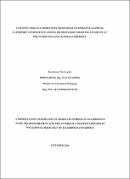| dc.description.abstract | The study sought to address the problem of declining clinical clerkship competence among
Orthopaedic Medicine students at the Uganda Institute of Allied Health and Management
sciences, Mulago.The main objective of the study was to utilize available skills laboratory
resources to enhance clinical clerkship competence among the orthopaedic medicine students.
A participatory qualitative action research design was employed guided by the future
workshop model of action research. Participation in the study was voluntary involving sixty
four stakeholders of the School of Orthopaedic Medicine. Forty two of these were year three
students, two orthopaedic surgeons/lecturers, three administrators, two principal tutors, nine
senior orthopaedic officers, one ward matron, two parents, and three information and
communication technology specialists. Future workshops, document review, questionnaire,
interviews, focus group discussions, observation, photography, pre-posttest evaluation were
used as methods of data collection. Both descriptive and comparative approaches were used
to analyze the data. In its preliminary phase, the study found out that there was lack of
clinical clerkship curriculum, key essential curriculum materials for establishing a functional
skills lab, clinical instructors, coordinators, technician and reliable evaluation and grading
system for timely feedback. On evaluation of implemented interventions, it was found out
that some skills lab resources such as a clerkship curriculum and 8 study guides were
acquired 5/8(62.5%) of which were practiced). In post skills lab-based training evaluation,
24/42 (57.1 %) of the students got an outstanding overall average score of over 80 % during
their four weeks-long practicum rotations while only I /42 (2.4%) of the same traditionally
trained group got an outstanding score. The number of students rated incomplete in the
traditionally trained group reduced from 13/42 (31 %) to 6/42 ( 14.3%). Of all the team players
11/ 12 (91.7%) believed that lack of funds was a key factor that stalled the action plan to be
fully implemented. The key attributes for the success attained involved guiding students carry
out the assigned procedural tasks and stakeholders' commitment to support training the
students using the available resources at the practicum sites. It was concluded that utilisation
of available skills lab resources considerably improved clerkship competence among students
at the school of Orthopaedic Medicine- Mulago. Adopting the use of skills labs in the
institute, establishment of a fully-fledged and well equipped skills lab, recruitment of skilled
manpower to run the skills lab were among the recommendations made. Another Future
Workshop should be held to facilitate the stakeholders to re-plan new strategies for solving
the pending issues related to equipping the current skills lab and improving on the available
resources. | en_US |

